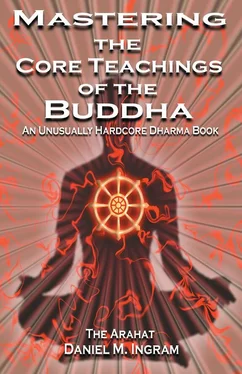Daniel Ingram - Mastering the Core Teachings of Buddha - An Unusually Hardcore Dharma Book
Здесь есть возможность читать онлайн «Daniel Ingram - Mastering the Core Teachings of Buddha - An Unusually Hardcore Dharma Book» весь текст электронной книги совершенно бесплатно (целиком полную версию без сокращений). В некоторых случаях можно слушать аудио, скачать через торрент в формате fb2 и присутствует краткое содержание. Год выпуска: 2009, ISBN: 2009, Издательство: Aeon Books, Жанр: Старинная литература, на русском языке. Описание произведения, (предисловие) а так же отзывы посетителей доступны на портале библиотеки ЛибКат.
- Название:Mastering the Core Teachings of Buddha - An Unusually Hardcore Dharma Book
- Автор:
- Издательство:Aeon Books
- Жанр:
- Год:2009
- ISBN:9781904658405
- Рейтинг книги:5 / 5. Голосов: 1
-
Избранное:Добавить в избранное
- Отзывы:
-
Ваша оценка:
- 100
- 1
- 2
- 3
- 4
- 5
Mastering the Core Teachings of Buddha - An Unusually Hardcore Dharma Book: краткое содержание, описание и аннотация
Предлагаем к чтению аннотацию, описание, краткое содержание или предисловие (зависит от того, что написал сам автор книги «Mastering the Core Teachings of Buddha - An Unusually Hardcore Dharma Book»). Если вы не нашли необходимую информацию о книге — напишите в комментариях, мы постараемся отыскать её.
Mastering the Core Teachings of Buddha - An Unusually Hardcore Dharma Book — читать онлайн бесплатно полную книгу (весь текст) целиком
Ниже представлен текст книги, разбитый по страницам. Система сохранения места последней прочитанной страницы, позволяет с удобством читать онлайн бесплатно книгу «Mastering the Core Teachings of Buddha - An Unusually Hardcore Dharma Book», без необходимости каждый раз заново искать на чём Вы остановились. Поставьте закладку, и сможете в любой момент перейти на страницу, на которой закончили чтение.
Интервал:
Закладка:
These models may directly state or imply that enlightenment
involves continuously perceiving these aspects of things in all sensations at a conscious level, so that every waking instant we were flooded with the sense of impermanence or luminosity or whatever as our dominant experience. While attempting to perceive this at all times is excellent practice advice, particularly when on retreat, were these models true then realization would seem to involve flooding the consciousness of the individual with a ton of information at all times. While there may be moments or bursts of this sort of perception in enlightened individuals, this is not what finally happens. Instead, with strong awareness of how things are, a process of identification stops, the switch is thrown, as noted above in the Non-Duality Models. By following the practice advice of the Fundamental Perception Models we may come to stop this process.
270
Models of the Stages of Enlightenment However, as the Buddha said, do not imagine that you must
continue to carry the boat once you have crossed the river. While enlightened individuals can at a whim notice the true aspects of sensations, just as color is clear to a person with good eyesight (assuming they are not color-blind), so these things are clear to an enlightened being to various degrees as they progress along the path. That said, just because one can perceive something doesn’t mean that particular aspect is the dominant aspect of consciousness at all times. In short, the Fundamental Perception Models are very useful for practice, but do not quite accurately describe the final result.
THE SPECIFIC PERCEPTION MODELS
Specific Perception Models essentially state or imply that an enlightened being will be constantly hyper-aware of every single sensation that arises in their field of perception, including not just the ultimate aspects of the Fundamental Perception Models, but also every single little detail of the content of those sensations, achieving at all times the perfected fusion of the completely open and panoramic perspective of High Equanimity with the laser-like precision of the Arising and Passing Away at its height. It implies that rather than stopping a process, enlightenment is about becoming so fantastically alert that you see not only the true nature but also the specifics of each and every sensation that arises at all times. This is not even close to what happens in reality. While enlightened beings will cycle through those stages, when mindfulness is low each of those stages will present in a low key way, and only for moments here and there will there be anything like that kind of awareness, though when enlightened beings are on retreat and/or really powering the mindfulness and concentration they can temporarily achieve something that resembles these high ideals.
The Specific Perception Models are another instance where practice instructions get turned into an ideal of what is supposed to happen in exactly the same way as happens with the Fundamental Perception Models. They become one more example of carrying the boat after we have crossed the river. Again, mindfulness comes and goes, sleep comes and goes (though the Tibetan teachings on dream yoga are very intriguing), concentration comes and goes, various perspectives and 271
Models of the Stages of Enlightenment
perceptual thresholds parade through, and the cycles of the ñanas continue on and on.
The ideals in this model and many models that follow it are
sometimes used as a weapon by those who like to criticize those who rightly or wrongly claim to be enlightened. Examples include, “Don’t you remember when I said (such and such)?”, “Didn’t you notice how I cleaned the bathroom?”, or “How could you have forgotten to pay the power bill?” The implication inherent in each of these is that enlightened being should have perfect awareness of all aspects of their sensate reality as well as perfect memory of all of those aspects. This ideal is unfortunately completely bogus. I so wanted to be a Sensation Perceiving Superstar with a photographic memory and have been sorely disappointed. As basically everyone out there has some aspect of this model in their working definition of what “enlightenment” must be, these ideals can be a particular problem in relationships, particularly business relationships and romantic ones for those who are out of the closet about enlightenment.
In this basic vein, this brings up another selling point of realistic, down-to-earth, human models of what awakening brings. If you tell people you are enlightened and also promote very high, idealized, delusional, perfectionistic models of awakening, those who actually get to know well will realize how full of shit you are, particularly people such as spouses or partners, business associated, best friends and the like. Further, the more you get stuck trying to be like the person you dream you are supposed to be rather than who you are, the more you can get isolated in your false and pretentious fantasy land, locked away from the grounding, healing, and helpful reality testing that comes from community and real, intimate human relationships. However, if the Specific Perceptual Models are a problem in this way, you haven’t seen anything until you get to the Emotional Models.
THE EMOTIONAL MODELS
The Emotional Models are so fundamental to the standard ideals of awakening as to be nearly universal in their tyranny. You can’t swing a dead cat in the Great Spiritual Marketplace without hitting them.
Almost every tradition seems to have gone out of its way to promote them in the most absurd and life-denying terms available, though there 272
Models of the Stages of Enlightenment have been attempts at reform also. I must give thanks for the attempts, however ineffective, bizarre, mythologized, cryptic, and vague, that the Tibetan and Zen traditions have occasionally made in this regard, and morn their nearly perpetual failure to make these issues clear. At least they tried, whereas the Theravada basically has really not tried in any significant way in 2,500 years so far as I can tell. If I am wrong, please let me know.
These emotional models basically claim that enlightenment involves some sort of emotional perfection, either gradually or suddenly, and usually make these dreams the primary criteria for their models of awakening and often ignoring or sidelining issues relating to clear perception of the true nature of phenomena. Usually these fantasies involves elimination of the “negative” emotions, particularly greed, hatred, anger, frustration, lust, jealousy, and sadness. At a more fundamental level, they promise the elimination of all forms of attraction and aversion.
As I am sure you can already tell, I am no fan of these models of enlightenment. In fact, I consider their creation and perpetuation to be basically evil in the good old “You Should Burn In Hell For
Perpetuating Them” kind of way, though as guidelines for trying to be kind and behave well (training in morality) I find them of value. I know both what hints of truth they contain and also what a marketing ploy they are, and will attempt to make both aspects clear. This is not easy to do, and the dogma of the Emotional Models is so deeply ingrained in us all that shaking it can be the work of a lifetime even in enlightened beings.
The practical application of making this distinction is based upon the fact that we will try to realize the model we consciously or unconsciously adopt. It is extremely tempting if we buy into the limited emotional range models to go around imitating an emotionally limited state, repressing or ignoring aspects of our basic human nature. There are some benefits to repressing the manifestations of negative emotions while simultaneously being conscious and accepting of the fact that difficult emotions occur. However, if we repress them and also pretend that they don’t exist, this sort of cultivated denial can also produce huge shadow sides and a lot of neurotic behavior.
Читать дальшеИнтервал:
Закладка:
Похожие книги на «Mastering the Core Teachings of Buddha - An Unusually Hardcore Dharma Book»
Представляем Вашему вниманию похожие книги на «Mastering the Core Teachings of Buddha - An Unusually Hardcore Dharma Book» списком для выбора. Мы отобрали схожую по названию и смыслу литературу в надежде предоставить читателям больше вариантов отыскать новые, интересные, ещё непрочитанные произведения.
Обсуждение, отзывы о книге «Mastering the Core Teachings of Buddha - An Unusually Hardcore Dharma Book» и просто собственные мнения читателей. Оставьте ваши комментарии, напишите, что Вы думаете о произведении, его смысле или главных героях. Укажите что конкретно понравилось, а что нет, и почему Вы так считаете.












